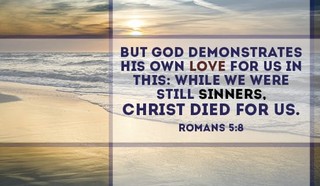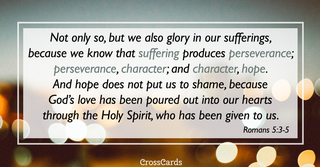
- Recent Translations
- All Translations
Romans 5
Share
Settings
Romans 5 Commentary
Chapter 5
The happy effects of justification through faith in the righteousness of Christ. (1-5) That we are reconciled by his blood. (6-11) The fall of Adam brought all mankind into sin and death. (12-14) The grace of God, through the righteousness of Christ, has more power to bring salvation, than Adam's sin had to bring misery, (15-19) as grace did superabound. (20-21)
Verses 1-5 A blessed change takes place in the sinner's state, when he becomes a true believer, whatever he has been. Being justified by faith he has peace with God. The holy, righteous God, cannot be at peace with a sinner, while under the guilt of sin. Justification takes away the guilt, and so makes way for peace. This is through our Lord Jesus Christ; through him as the great Peace-maker, the Mediator between God and man. The saints' happy state is a state of grace. Into this grace we are brought, which teaches that we were not born in this state. We could not have got into it of ourselves, but we are led into it, as pardoned offenders. Therein we stand, a posture that denotes perseverance; we stand firm and safe, upheld by the power of God. And those who have hope for the glory of God hereafter, have enough to rejoice in now. Tribulation worketh patience, not in and of itself, but the powerful grace of God working in and with the tribulation. Patient sufferers have most of the Divine consolations, which abound as afflictions abound. It works needful experience of ourselves. This hope will not disappoint, because it is sealed with the Holy Spirit as a Spirit of love. It is the gracious work of the blessed Spirit to shed abroad the love of God in the hearts of all the saints. A right sense of God's love to us, will make us not ashamed, either of our hope, or of our sufferings for him.
Verses 6-11 Christ died for sinners; not only such as were useless, but such as were guilty and hateful; such that their everlasting destruction would be to the glory of God's justice. Christ died to save us, not in our sins, but from our sins; and we were yet sinners when he died for us. Nay, the carnal mind is not only an enemy to God, but enmity itself, chap. (Roamns 8:7, Colossians 1:21 ) . But God designed to deliver from sin, and to work a great change. While the sinful state continues, God loathes the sinner, and the sinner loathes God, ( Zechariah 11:8 ) . And that for such as these Christ should die, is a mystery; no other such an instance of love is known, so that it may well be the employment of eternity to adore and wonder at it. Again; what idea had the apostle when he supposed the case of some one dying for a righteous man? And yet he only put it as a thing that might be. Was it not the undergoing this suffering, that the person intended to be benefitted might be released therefrom? But from what are believers in Christ released by his death? Not from bodily death; for that they all do and must endure. The evil, from which the deliverance could be effected only in this astonishing manner, must be more dreadful than natural death. There is no evil, to which the argument can be applied, except that which the apostle actually affirms, sin, and wrath, the punishment of sin, determined by the unerring justice of God. And if, by Divine grace, they were thus brought to repent, and to believe in Christ, and thus were justified by the price of his bloodshedding, and by faith in that atonement, much more through Him who died for them and rose again, would they be kept from falling under the power of sin and Satan, or departing finally from him. The living Lord of all, will complete the purpose of his dying love, by saving all true believers to the uttermost. Having such a pledge of salvation in the love of God through Christ, the apostle declared that believers not only rejoiced in the hope of heaven, and even in their tribulations for Christ's sake, but they gloried in God also, as their unchangeable Friend and all-sufficient Portion, through Christ only.
Verses 12-14 The design of what follows is plain. It is to exalt our views respecting the blessings Christ has procured for us, by comparing them with the evil which followed upon the fall of our first father; and by showing that these blessings not only extend to the removal of these evils, but far beyond. Adam sinning, his nature became guilty and corrupted, and so came to his children. Thus in him all have sinned. And death is by sin; for death is the wages of sin. Then entered all that misery which is the due desert of sin; temporal, spiritual, eternal death. If Adam had not sinned, he had not died; but a sentence of death was passed, as upon a criminal; it passed through all men, as an infectious disease that none escape. In proof of our union with Adam, and our part in his first transgression, observe, that sin prevailed in the world, for many ages before the giving of the law by Moses. And death reigned in that long time, not only over adults who wilfully sinned, but also over multitudes of infants, which shows that they had fallen in Adam under condemnation, and that the sin of Adam extended to all his posterity. He was a figure or type of Him that was to come as Surety of a new covenant, for all who are related to Him.
Verses 15-19 Through one man's offence, all mankind are exposed to eternal condemnation. But the grace and mercy of God, and the free gift of righteousness and salvation, are through Jesus Christ, as man: yet the Lord from heaven has brought the multitude of believers into a more safe and exalted state than that from which they fell in Adam. This free gift did not place them anew in a state of trial, but fixed them in a state of justification, as Adam would have been placed, had he stood. Notwithstanding the differences, there is a striking similarity. As by the offence of one, sin and death prevailed to the condemnation of all men, so by the righteousness of one, grace prevailed to the justification of all related to Christ by faith. Through the grace of God, the gift by grace has abounded to many through Christ; yet multitudes choose to remain under the dominion of sin and death, rather than to apply for the blessings of the reign of grace. But Christ will in nowise cast out any who are willing to come to him.
Verses 20-21 By Christ and his righteousness, we have more and greater privileges than we lost by the offence of Adam. The moral law showed that many thoughts, tempers, words, and actions, were sinful, thus transgressions were multiplied. Not making sin to abound the more, but discovering the sinfulness of it, even as the letting in a clearer light into a room, discovers the dust and filth which were there before, but were not seen. The sin of Adam, and the effect of corruption in us, are the abounding of that offence which appeared on the entrance of the law. And the terrors of the law make gospel comforts the more sweet. Thus God the Holy Spirit has, by the blessed apostle, delivered to us a most important truth, full of consolation, suited to our need as sinners. Whatever one may have above another, every man is a sinner against God, stands condemned by the law, and needs pardon. A righteousness that is to justify cannot be made up of a mixture of sin and holiness. There can be no title to an eternal reward without a pure and spotless righteousness: let us look for it, even to the righteousness of Christ.
Romans 5 Commentaries
Chapter Summary
INTRODUCTION TO ROMANS 5
The Apostle having clearly stated, and fully proved the doctrine of justification by the righteousness of faith, proceeds to observe the comfortable fruits and effects of this great blessing, known and enjoyed by the believer; as also the source and spring of it, the love of God, which appears in the death of Christ, in the room and stead of his people, which is the foundation on which it stands; and likewise gives an illustration of this benefit, by comparing the two heads, Adam and Christ, together. The first fruit and effect of justification, as a benefit perceived and enjoyed by faith, is peace with God through Christ, Ro 5:1. The next is access through the Mediator to the throne of grace, where justified ones stand with a holy boldness and confidence, and the third is a cheerful hope of eternal glory, Ro 5:2, yea, such not only have joy in the hope of what is to come, but glory even in present afflictions; which prevents an objection that might be made to the above mentioned fruits and effects of justification, taken from the tribulations which saints are exercised with: and what occasions glorying even in these, is the sanctified use, or happy produce of afflictions, these being the means of exercising and increasing patience; by means of which a larger experience of divine things is gained; and through that, hope is confirmed, and all influenced by a plenteous discovery of the love of God to the soul, by the Spirit, Ro 5:4,5, an instance of which love is given, Ro 5:6, in Christ's dying for men; which love is enhanced by the character and condition of the persons for whom Christ died, being ungodly, and without strength; and by the time of it, being due time: then follows a further illustration of this love, by comparing it with what instances of love are to be found among men, Ro 5:7, by which it appears to be unparalleled; since scarcely for a righteous man, peradventure for a good man, one would die, yet no man dies for the ungodly, as Christ did: hence as his, so his Father's love is highly commended, by giving him up to death for persons while in such a state and condition, and under such a character, Ro 5:8, and justification now springing from this love, and being founded on the death of Christ, hence follow a security from wrath to come, Ro 5:9, a certainty of salvation, Ro 5:10, which is strongly argued from the different characters those Christ died for bear, before and after reconciliation, and from the death to the life of Christ, Ro 5:10, and also a rejoicing and glorying: in God through Christ, full expiation being made by his blood for sin, and this received by faith, Ro 5:11, and then the apostle proceeds to compare the two heads, Adam and Christ, together; the design of which is to show the largeness and freeness of the love and grace of God; how righteousness for justification comes by Christ; and how the persons, before described as sinners and ungodly, came to be in such a condition; and that is through the sin of the first man, in whom they all were, and in whom they all sinned and died, Ro 5:12, wherefore there must be a law before the law of Moses, or there could have been no sin, Ro 5:13, but that sin was in being, and was reckoned and imputed to the posterity of Adam, is clear from this single instance, death's power even over infants, from the times of Adam to Moses, Ro 5:14 who therefore must be a public head, representing all his posterity; so that they were involved in the guilt of his sin, which brought death upon them; and in this he was a type of Christ, as is asserted in the same verse; that so as Adam was but one, and by one sin of his conveyed death to all his seed; so Christ, the Mediator, is but one, and by his one obedience conveys righteousness and, life to all his seed: and yet in some things there is a dissimilitude; sin and death, through the first man, are conveyed in a natural way to his offspring, but righteousness and life from Christ in a way of grace, Ro 5:15, It was one offence of Adam's, which brought condemnation and death upon all his posterity; but the righteousness of Christ is not only a justification of his seed from that one offence, but from all others, Ro 5:16, the one is unto death, the other unto life; and greater is the efficacy in the one to quicken, than in the other to kill, Ro 5:17, where a repetition is made of what is said in Ro 5:15, with an explanation, and the similitude between the two heads is clearly expressed, Ro 5:18, where condemnation on account of the sin of Adam, and justification through the righteousness of Christ, are opposed to each other; and both as extending to the whole of their several respective offspring, condemnation through Adam's offence to all his natural seed, and justification of life through Christ's righteousness to all his spiritual seed; which is still more fitly and clearly expressed in Ro 5:19, where the way and manner in which the one become sinners, and the other righteous, is plainly directed to; that it is, by the imputation of Adam's disobedience to the one, and by the imputation of Christ's righteousness to the other: in Ro 5:20, an objection is obviated, which might be formed thus; if justification is by the grace of God, and through the obedience and righteousness of Christ, then the law is of no use; what purpose does that serve? what occasion was there for its entrance? The apostle replies, that though justification is not by it, yet a good end is answered by its entrance; for hereby sin is more known to be what it is, both original and actual; and the grace of God appears more abundant in justification from it, and in the pardon of it; and this grace is further illustrated in Ro 5:21, by comparing sin and grace together, and the different effects of their empire over the sons of men; the one reigning unto death, the other reigning through righteousness to eternal life by Christ.

